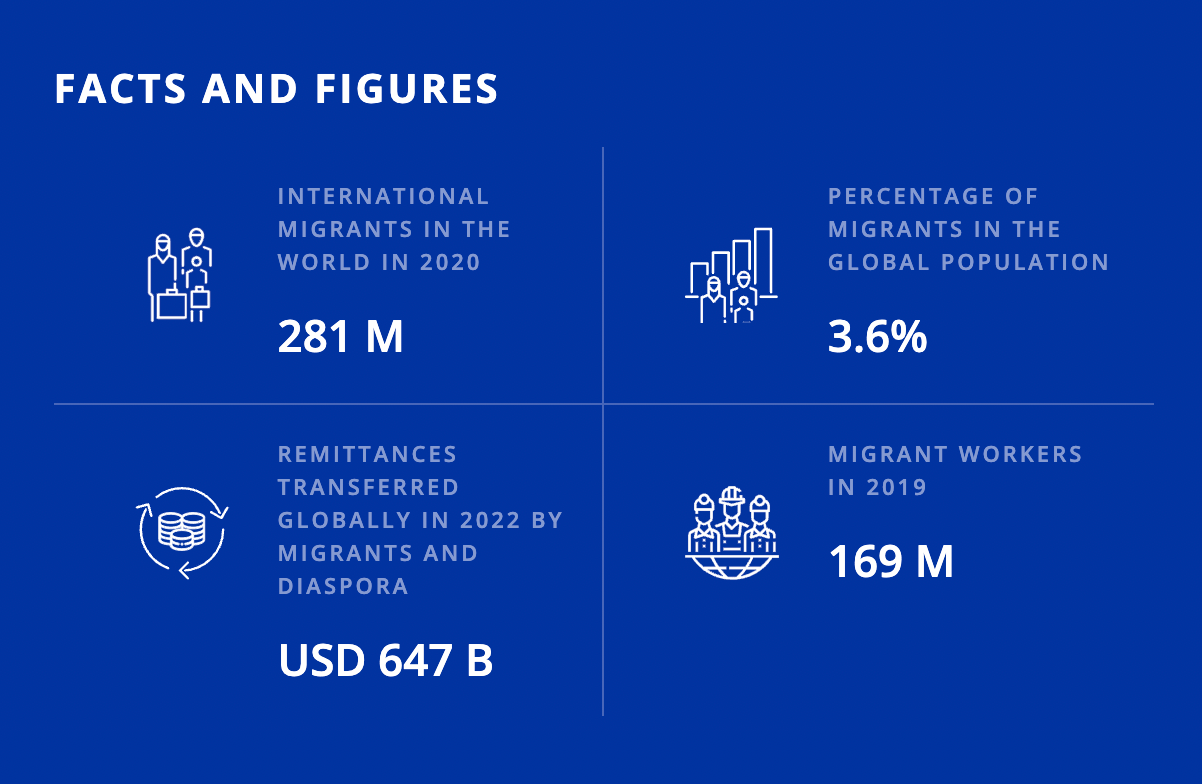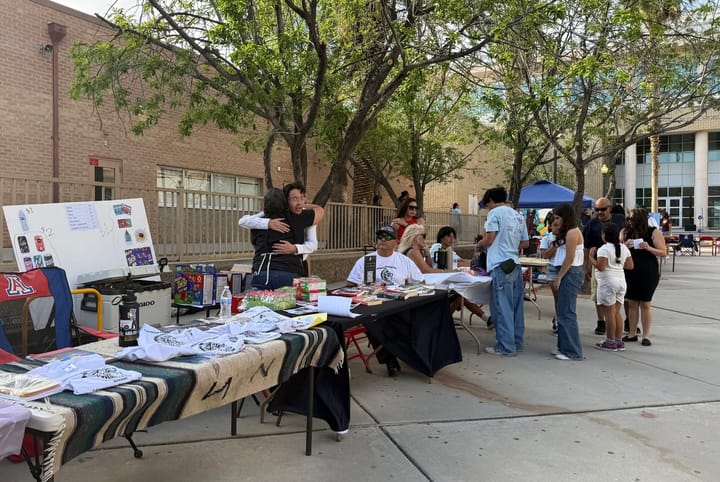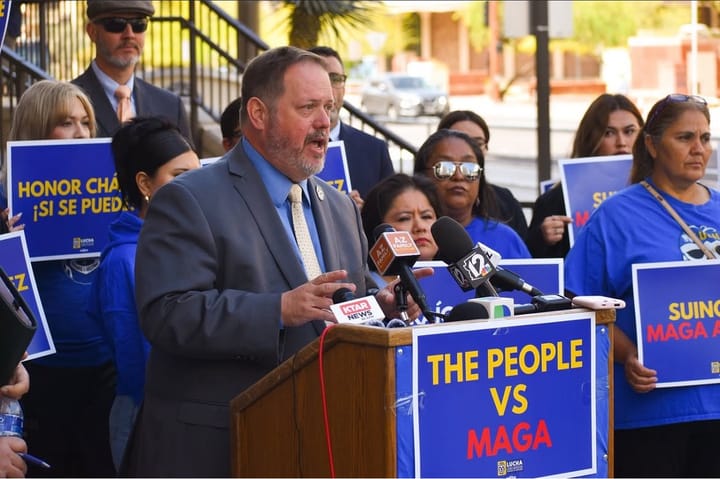Local event honors migrants’ contributions and highlights ongoing challenges
Local human rights advocacy group Derechos Humanos is commemorating International Migrants Day Saturday from 3-6 p.m. at the Global Justice Center.

International Migrants Day is next week, and one local group is taking the opportunity to bring attention to the pivotal role migrants play in the global economy and the challenges they still face.
The day of recognition, celebrated on December 18, was established by the United Nations in 2000 to highlight the growing phenomenon of international migration and to acknowledge the right to “reap the benefits” of it.
Migrants, documented and undocumented, play a vital role in the global economy. In the U.S., migrants have generated over $4.6 trillion of economic output and contributed significantly to the construction, agricultural and hospitality industries.
Local human rights advocacy group Derechos Humanos is commemorating the occasion Saturday from 3-6 p.m. at the Global Justice Center (225 E. 26th Street.)
Attendees can enjoy food, music and a folklorico dance presentation, while also giving back to Southern Arizona through a toy drive for asylum-seeking children.
The drive will benefit Casa de la Misericordia, a migrant and refugee shelter in Nogales, Sonora. The group is asking attendees to bring unwrapped gifts for kids of all ages. The event will also include short presentations on why they are celebrating and what the migratory landscape looks like now.
“There are a huge number of people on the move, migrating and looking for a place where their family's life and their life is better and safer,” Derechos Humanos organizer Violeta Dominguez told Tucson Spotlight. “It is a human right that all people have. It is important to recognize the right to migrate that people have, the right to a dignified life and to recognize that migrants in general are people who contribute in very important ways to the places to which they go.”
The United States has more immigrants than any other country, with one fifth of the world’s international migrants calling the U.S. home, according to Pew Research Center.
There was a historic increase of migrants in 2023, and today, migrants account for 14% of the U.S. population.
According to that same Pew report, Latin America makes up 49% of modern migration with South/East Asia, Europe and Africa/Middle East following. While migration is happening to other countries in the global north like Germany, Spain, England and France, the U.S. has long been an attractive country for migrants to travel to.
“The U.S. is economically powerful. We’ve always had a demand for labor and if you look at our unemployment rate, unless you're looking at a recession period, having that unemployment rate at like 3%... you don't find a nation like this in terms of that available work. That's a big driver, it’s a big attraction,” said Dr. Anna Ochoa O’Leary, co-director of the Binational Migration Institute. “People want to secure their families, they want an income, they want to feed their children. That's a critical driver of why almost anybody does anything, is to make sure that your family's well taken care of.”
Some move to chase the “American Dream,” with the idea that the quality of life in the U.S. will be much better.
And while the UN says that peace, security, good governance and the opportunity for decent work ensure that people migrate out of their countries of origin by choice instead of necessity, many of today’s migrants are fleeing poverty, hunger and persecution.
That is the case for many Venezuelans, who’ve been fleeing their country for nearly a decade.
The U.N. reports that more than 6.1 million refugees and migrants have left Venezuela as a result of the political turmoil, socio-economic instability and the ongoing humanitarian crisis, along with the recent elections.
Many take a dangerous journey, crossing first the Darien Gap, Central America and then Mexico before making it to the U.S.

Venezuela faced an economic collapse in 2014 when global oil prices dropped. The country is home to the world’s largest and nationalized oil reserves and its economy depended solely on petroleum.
The country was further debilitated by President Donald Trump’s sanctions in 2017 and 2018, which prohibited buying Venezuelan government bonds and blocked oil revenue from U.S. entities, freezing Venezuela's financial transactions and isolating the country economically.
Protests erupted over the state of the country, birthing guarimberos, or protestors who Venezuelan President Nicolás Maduro has called terrorists but are seen as martyrs to the opposition. Many of these guarimberos are everyday citizens, but thousands have been detained or disappeared by Maduro’s regime.
Spotlight spoke with Venezuelan journalist Flo Tomasi, who covered the 2024 Venezuelan presidential election and has written about migration in her country for various local news organizations.
“There were working mothers who said they could not feed their children … The only thing that was eaten during that time – my family has lived this – was arepas with butter. There was nothing,” Tomasi said. “In the supermarkets there was a very strong import crisis. It was an economic crisis that became a humanitarian crisis. People were hungry and people left because of hunger.”
While covering the election this summer, Tomasi included bread and slices of ham and cheese in her camera bag, because she knew that grocery stores would likely close during the election due to protests without having a sure date of when they would re-open.
She said she was sitting on the back of a truck when she opened her bag filled with expensive equipment including lenses, microphones and a camera, but also the bread, ham and cheese.
A young boy asked if he could have some food, and soon the bag was being passed around, with people helping themselves to its contents.
When her bag was returned, the food was gone but her equipment was untouched.
She says that while the economy is slowly stabilizing, more people left in July after the elections when Maduro declared himself the winner, despite many people, including U.S. Secretary of State Antony Blinken, pointing to overwhelming evidence that his opposition had actually won.
After the election, protestors were detained and disappeared in an unprecedented crackdown on people who opposed Maduro’s election, with journalists and activists at the forefront. Many Venezuelans are now stuck outside of their country in limbo.
Despite this, various U.S. and Mexico policy decisions have made it harder for Venezuelans to seek asylum in the U.S., like President Joe Biden’s Executive Order to limit entry for asylum seekers and the “Remain in Mexico” policy, which works to wear migrants down by the time they reach the U.S. border.
In Arizona, the Venezulans‘ plight is further exacerbated by the lack of a Venezuelan consulate, with the nearest in San Francisco. This leaves thousands of Venezuelans without a vital resource.
In addition to Venezuela, people are fleeing many other countries because of poverty, hunger, repression, persecution, climate change and other reasons. And migrants of all nationalities wait in uncertainty for the Trump administration to take office, following campaign promises of mass deportations of all immigrants, even the U.S.-born children of immigrants.
“We must fight the narrative of migrants as criminals, because that is not the reality and we must put emphasis on the right to migration as a human right and the enormous contribution that migrants make to this country,” said Derechos Humanos’ Dominguez.
Susan Barnett is Deputy Editor of Tucson Spotlight and a graduate student at the University of Arizona. She previously worked for La Estrella de Tucson. Contact her at susan@tucsonspotlight.org.
Tucson Spotlight is a community-based newsroom that provides paid opportunities for students and rising journalists in Southern Arizona. Please support our work with a paid subscription.




